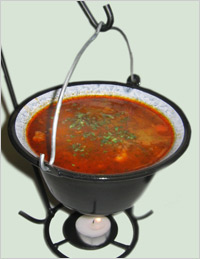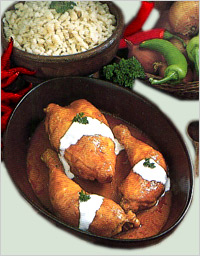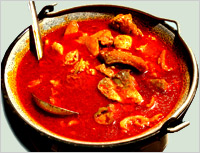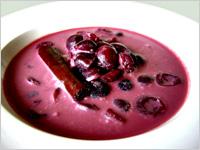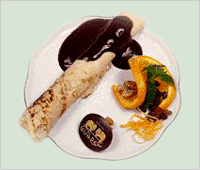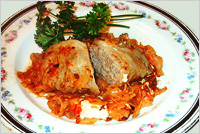 |
musical instruments |
recipes |
photos |
useful organisations |
win a copy of the book |
HUNGARIAN RECIPES AS COOKED IN HUNGARIAN DANCES - (Recipes serve 6-8 unless otherwise stated) |
||||||
ERZSÉBET’S AUTHENTIC BOGRÁCSGULYÁS (With thanks to Gundel’s Hungarian Cookbook, from which this version is freely adapted) |
||||||
|
1kg beef, cubed into approx 2cm pieces Fry the chopped onion in the melted lard until golden brown. Lower heat and add the paprika, stir rapidly, then add the meat, with salt to season. Keep stirring. When the meat has browned and the liquid has evaporated, add caraway seeds, garlic and a small amount of cold water. Cover and braise slowly, stirring occasionally and adding more water if necessary (NB braise, don’t boil). Just before the meat is completely tender, add the potatoes, green peppers and tomatoes. Add the csipetke before serving according to the length of time it needs to cook (should be quick) and adjust quantity by adding water or stock. To adapt to gulyás Hungarian plain style, omit the csipetke. |
|||||
JAMIE AND MIMI’S FAVOURITE CHICKEN PAPRIKÁS (With thanks to Gundel’s Hungarian Cookbook, from which this version is freely adapted) |
||||||
|
100g lard or shortening Fry onions in the lard until light yellow. Reduce heat, add the paprika, stir then add the chicken and salt to season. When browned, add a small amount of water or stock, and spices and/or herbs to taste. Simmer until cooked through, stirring occasionally but do not boil. When ready, add the vegetables. When cooked, mix the flour with the sour cream, draw off the heat and mix into the gravy. Serve with galushka dumplings or rice or potatoes, and a green salad if desired. Karina has found that this recipe can be adapted for the weight-conscious by using half-fat sour cream or crème fraiche. If alarmed by lard, use vegetable oil. |
|||||
| ERZSÉBET’S CHRISTMAS EVE FISH SOUP (HALÁSZLÉ) | ||||||
|
Erzsébet cooks fish soup every Christmas Eve. Karina associates it with celebration and orders it in Budapest after her first concert in years… 2kg freshwater fish, filleted and skinned, with roe and coral if possible. (Ideally use carp. For Szeged version add to this catfish, sturgeon and pike-perch. Unfortunately you are unlikely to find these in your local UK supermarket, but a reasonable imitation can be achieved with whatever freshwater alternatives are available) Up to a day before you want to eat the soup, make Court Bouillion with fresh fish heads, bones, skin and fins: boil them in 2 litres of water with onion, salt, some green peppers and a tomato for 1-1 ½ hours. When ready, strain. Score the thicker part of the fillets. Puree the vegetables, strain and add to Court Bouillion. Heat the bouillion to boiling point, then add the paprika and a splash of red wine if desired. Add the fish fillets plus the fish roe and coral and cook until tender. |
|||||
KARINA’S COLD CHERRY SOUP (MEGGYLEVES) |
||||||
|
Karina adores this coolest of cool Hungarian starters and cooks it with Rohan’s help on her name-day. It can alternatively be served as a dessert. Alter the quantities according to taste: more flour to thicken, more or less sugar, whipping cream instead of sour if for dessert, add a little lemon rind if desired. Half-fat sour cream can be used of course. Make it your own. 500g morello cherries, fresh, frozen or from a jar, pitted. Cook the cherries in the water until tender with lemon juice, cloves and cinnamon. Add sugar and the splash of wine or sherry. Draw off the heat. Mix flour with sour cream and stir into the pink mixture. Chill thoroughly before serving; decorate the bowls with mint leaves, a slice of lemon or some fresh whole cherries. |
|||||
| THE ST FRANCIS QUARTET’S BUDAPEST WALNUT PALACSINTA & CHOCOLATE SAUCE (With thanks to Gundel’s and the Sydney Morning Herald, from which this version is freely adapted. Serves 4-6.) |
||||||
|
Rohan, Karina and their friends of the St Francis String Quartet feast on this hearty dessert after their Budapest concert. Genya is especially partial to the chocolate sauce. Chocolate sauce 3 tbsp cocoa 3 tbsp sugar 3 yolks 200ml milk 100ml cream 125g dark chocolate, chopped 4 tbsp dark rum or brandy 60g butter to finish cooking pancakes Pancakes 3 eggs, beaten 1 cup milk 1 cup plain flour 50g butter Filling 125g walnuts 60g raisins 60g sugar Zest of 1/2 a lemon 4 tbsp dark rum or brandy Chocolate sauce Beat cocoa, sugar and yolks together. Bring milk and cream to the boil and pour over the yolk mixture, whisking. Return to heat and cook gently, stirring, until the custard thickens. Remove from heat and add chocolate and rum, stirring until combined. Keep sauce warm while you cook the pancakes. Pancakes Whisk the eggs and milk into the flour to make a smooth batter. Let stand for 10 minutes. The consistency should be like pouring cream - add a touch more milk if necessary. Heat a frying pan, add a knob of butter and melt to coat the pan. When butter is foaming, pour in a ladle of batter, moving the pan around so that the batter covers the whole base. Cook over medium-high heat until the pancake is golden-brown underneath. Turn over with a spatula, cook the other side then, transfer to a plate. Continue with the rest of the batter and set aside. For the filling Finely chop the walnuts and the raisins (or blitz in food processor), and combine with the sugar, zest and rum. Place a spoonful in each pancake and fold into four so that they look like triangles. Repeat with the remaining pancakes. Heat a large frying pan with the butter and fry the filled pancakes gently to warm through, on both sides. Traditionally they’re sprinkled with rum and flamed at the table before adding the chocolate sauce; alternatively, just sprinkle a little rum over them and serve at once with the chocolate sauce poured on top. |
|||||
KARINA’S NAME-DAY STUFFED CABBAGE (serves 6) (With thanks to Gundel’s Hungarian Cookbook, from which this version is freely adapted) |
||||||
|
This impressive and extremely filling dish is as central European as can be. Karina has learned the recipe from her mother Erzsébet and cooks it as the centrepiece of her name-day dinner party. 100g rice Heat 10g lard, add rice and an equal volume of water (1 cup water for 1 cup rice). Salt to taste and simmer until partially cooked. Sauté 100g chopped onion until light brown. When the rice has cooled, add to the chopped meat. Cut the bacon into small pieces and add to the meat mixture, along with the eggs and spices. You can prepare the sauerkraut yourself if you’re feeling ambitious (Karina, being a busy mum and teacher, uses ready-made jars of it from the supermarket). Remove the heavy ribs from the cabbage leaves to make them more flexible. Place equal amounts of the chopped meat mixture onto the leaves. Fold the sides of the leaves around the stuffing and roll into a cylindrical shape. Fold under the ends of the rolls. Spread two-thirds of the sauerkraut on the bottom of a large pot. Place the stuffed cabbages on top in a single layer, place the smoked meat pieces on top of each one, then cover with the remaining sauerkraut. Brown the 20g chopped onion lightly in some lard, add the 1 ¼ tsp paprika and pour over the sauerkraut. Add enough water or sauerkraut to almost cover the lot. Add a little chopped garlic and pepper. Cover pot and simmer for 1- 1 1/2 hours, adding water as needed. Remove stuffed cabbages to a plate and keep warm. Prepare a light roux with onion, lard, paprika and flour. Thicken the sauerkraut with the roux, mix flour with sour cream and add to the mixture. Return to heat and bring to the boil. Place stuffed cabbages back on the sauerkraut and serve, with some sour cream poured over. |
|||||
(NB: These recipes are suggestions only. The author, publisher and webmaster cannot be held responsible for any problems encountered during cooking, serving or eating, nor is it our fault if the dishes do not prove to your liking!) |
||||||
